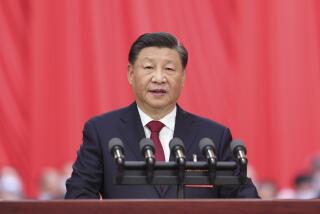Asian Officials Warn China Could Be ‘Great Black Hole’
NICE, France — There is a danger China is becoming a “great black hole” in Asia, siphoning off funds, expertise and workers from other Asian developing nations, according to officials who attended the Asian Development Bank’s annual meeting here earlier this month.
Thai banker Ashwin Kongsiri, president of the Industrial Finance Corp. of Thailand, said China’s appetite for funds is mind-boggling.
Indonesia, the largest recipient of ADB funds, poses a similar but lesser problem, he said.
Singapore’s Senior Minister Lee Kwan Yew also warned that China’s powerful suction effect on funds partly accounts for a slowdown in foreign investment in the newly industrializing nations of Southeast Asia.
“The implications for Asia, as well for the rest of the world, are both positive and negative.”
On the one hand, China’s growth will add an extra 0.5% to 1.0% to annual gross domestic product growth in Asia.
On the other hand, China, the world’s most populous nation, is already absorbing funds, workers and expertise.
In 10 years, China will be 10 times the economic force of Japan, Lee said.
“That changes the whole equation,” he said.
Kongsiri said despite the traditional thriftiness of the people of east Asia, private- and government-sector infrastructural spending needs will outpace their ability to save.
Estimates of Asia’s infrastructural investment needs in the years to the end of the decade range as high as $1 trillion, he added.
“In the next five years, (South) Korea, the Philippines, Indonesia and Thailand will spend more than they save to the tune of $164 billion, according to one estimate,” he said.
China is estimated to require around $100 billion in the next five years, Kongsiri said.
To cover the gap, Asian nations will have to borrow heavily from overseas, which presents difficulties given the relatively depressed state of the economies of western Europe, North America and Japan, he said.
The partial solution for more developed Asian economies will be to set up domestic debt markets to more effectively mobilize savings, Kongsiri said. “You can rest assured that any of the bigger economies which do not possess a domestic bond market will be working to develop one in the near future.”
More to Read
Sign up for Essential California
The most important California stories and recommendations in your inbox every morning.
You may occasionally receive promotional content from the Los Angeles Times.









